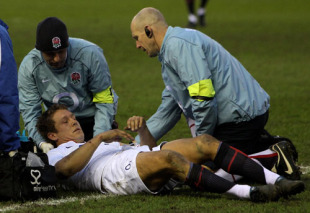|
Scotland 15-15 England, Six Nations, March 13
The replay's next week and I'm not coming
Huw Richards at Murrayfield
March 13, 2010

Could Jonny Wilkinson have saved the game at the death?
© Getty Images
Enlarge
"The replay's next week and I'm not coming." The incomparable Clive Rowlands, seeking something to say after one of the worst Wales-England matches, pretty much summed up some of the feeling kicking around following Scotland and England's Calcutta Cup stalemate. There is always the excitement felt at any match between old enemies, in front of a packed crowd, when you go into the final few minutes knowing any score may be decisive, but that's about it. That the final whistle was accompanied by something close to a groan, followed by some applause and a rapid exit by most spectators, summarised the mood at Murrayfield all too well. Nor did this result really suit anyone. England are out of the Championship race unless France come unstuck against Italy. Scotland are at least safe from a whitewash, but face the wooden spoon unless they can take something from their forbidding trip next week to Dublin. Neither will fancy their chances. Nobody could really complain. Scotland might cite the post that twice repelled Dan Parks penalties during the second-half, but the draw - the first in this fixture since Scotland coach Andy Robinson was a member of the England XV back in 1989 - was a fair result. Not only were there no tries, there was rarely any suggestion that one might be scored. Never was anyone seen to join the line at pace in the manner that Ireland consistently achieve. In soccer terms this was a certain 0-0 draw long before the final whistle. Scotland should see this as a missed opportunity. They were clearly the better team before half-time, their line-out working with impressive efficiency while their superb all-Glasgow 'Killer Bs' back row had the edge at the breakdown and made the hard yards with the ball in hand. Their problem, though, is that they strongly resemble the pre-Brian O'Driscoll Irish teams, with their forwards far likelier to make a break than a blunt and lumbering back division. It isn't that Scotland don't want to play decent attacking rugby, rather that - like England - they continue to lack the means. Hence the preference for the unglamorous talents of Parks, a sensible taker of comparatively conservative options, over the potentially more creative Phil Godman. Hence also their regular attempts to work Parks into positions where he can attempt a drop goal, a tactic with a success ratio of one out of three on this occasion. That 39th minute strike gave Scotland a 9-6 lead that scarcely reflected their overall superiority in the first-half. The second was disrupted by injuries and substitutions. This should really have favoured Scotland since England suffered the greater disruption. The loss of Ugo Monye after a ghastly head clash with Kelly Brown forced them to give Ben Youngs his debut out of position on the wing. Yet Scotland failed to do anything in the remaining 25 minutes to test either Youngs' nerve or the uncertainty he must have felt about his positioning. England's other significant injury was to Jonny Wilkinson, whose head collided with something solid as he and Steve Borthwick were attempting to halt the charging Max Evans. Wilkinson had already landed three penalties, taking his Six Nations total to 526 and passing Ronan O'Gara's all-time record, without doing much to placate those who argue that he is doing little to enliven England's back play. Yet the applause with which much of the crowd greeted the news of his departure reflected the relief felt by many Scots, who knew how dangerous Wilkinson might be in a close finish. The remaining time showed that England can play as dully with Toby Flood, a lively creative talent they appear not to fully appreciate, at outside-half as with Wilkinson. The real problem is still further forward where England, while gaining something of an ascendancy in the final quarter, simply do not provide ball with sufficient speed and efficiency. You could put Dan Carter behind a scrum-half who passes as well as Robert Jones, and you'd still struggle to create much with the sort of possession England supply. Ben Foden injected a little life after replacing the rather out of sorts Delon Armitage, but a replacement fullback is limited in the impact he can make. England, whose resilience is perhaps their best quality, might have pinched it at the end had Flood landed either a long-distance penalty that struck the underside of the crossbar or a drop-goal shot after the England pack had ground their way through the phases to offer him a chance from around 40 metres. The penalty was from the far edge of Wilkinson's range, but Scotland may in the end have felt grateful that he wasn't there to attempt that last-gasp drop. © Scrum.com
|
Live Sports
Communication error please reload the page.
-
Football
-
Cricket
-
Rugby
-
- Days
- Hrs
- Mins
- Secs
F1 - Abu Dhabi GP
Abu Dhabi Grand Prix December 11-131. Max Verstappen ()
2. Valtteri Bottas (Mercedes)
3. Lewis Hamilton (Mercedes)
4. Alexander Albon ()
5. Lando Norris ()
6. Carlos Sainz Jr ()
-
ESPNOtherLive >>
Snooker - China Open
Tennis - Miami Open

